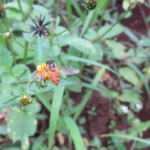


DARS Malawi, University of Greenwich & Royal Botanic Gardens, Kew
CIAT Malawi
Malawi
8/2009—8/2013
Research and development programs in southern Africa are being increasingly successful at increasing farmer access to early maturing, drought tolerant and multiple disease resistant legume cultivars with high yield potential compared to traditional land races. However yields, including of beans and cowpea under farmer-management remain low, commonly below 400 kg ha-1. A widespread, unresolved problem that contributes to the yield gap between the harvests farmers achieve and cultivar potential is insect attack. The management and control of insect pests is an important component of crop production and storage for poor farmers since it remains one of the few constraints over which they have some direct control. While commercial insecticides are usually effective, for small-scale farmers their availability is limited, their cost is high and knowledge issues such as poor labelling can compromise application guidance. Commercial products may also be adulterated which can lead to variable efficacy. Human health and safety is an additional problem since most synthetic products have known toxicity but are applied without suitable protection for applicators, no mechanism to ensure food safety for consumers, and little knowledge of their chronic effects since low acute impact leads to health and safety complacency. The environmental impacts can have serious consequences for wildlife but also for pollinators and natural enemies of pests. Finally, the cost of correctly applied synthetics can be prohibitive. A full year’s supply of Actellic Super dust (applied once every 3 months) can cost as much as 10% of the product value. Intervention, however, is imperative otherwise losses are guaranteed. There is increasing knowledge of a range of extracts that farmers make from local plants that are pesticidal and recent research has begun the systematic characterization of species that tend to be used only on a local scale. This research, suggests that botanical insecticides provide an effective but under-exploited alternative to synthetic pesticides, and their optimized application and promotion through well informed extension services with community based support would help farmers’ manage insect pests, improve productivity and reduce losses at little financial cost. While botanical pesticides do have known acute human toxicities they are applied at low doses of active ingredient, are generally not systemic or persistent. The project brings together researchers from Royal Botanic Gardens Kew, London, Natural Resources Institute, UK, national programs in Malawi and Tanzania and CIAT to characterize the active compounds in candidate pesticidal species found in southern Africa and to optimise harvesting, extraction and application methods under smallholder conditions.
Mechanisms of activity in pesticidal plant species determinedProduction, harvesting and application of pesticidal plant materials optimizedTechniques for field application through farmer participatory trials developed and optimizedHuman capacity development through postgraduate training achieved
The optimization of pesticidal plant technologies will provide poor farmers with effective, low cost, and environmentally benign pest management tools for specific pest species. Specific outcomes over four years of funding are likely to be:
